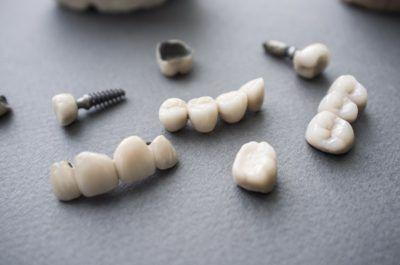
If you’re missing a tooth or two, you may have heard that a dental implant is what you need. But what are dental implants exactly and what do they do?
What are Dental Implants?
A dental implant is restorative dental procedure that keeps the jaw bone structure stable and surrounding teeth in alignment after a natural tooth or teeth have been lost. Implants are comprised of three components: a titanium post, an abutment and a crown. The cylindrical titanium post is surgically inserted by the dentist into the jaw where a missing tooth was. The abutment goes on top of the post and provides the foundation for the crown (also known as the fake tooth).
Dental implants can be used for replacing an individual tooth, a support for a dental bridge or dentures containing multiple teeth.
The titanium post works as a replacement for the roots of the missing tooth or teeth, while the crown serves as the actual replacement tooth or teeth. Dental crowns are often made in a dental lab and will be custom-made for the right size, shape and color of your natural teeth or tooth.
How do Dental Implants Work?
When a tooth or teeth are lost, the bone structure and stability of your jaw weakens because there is an absence of teeth roots. The space created by missing teeth can get filled in by other surrounding teeth, causing them to grow crooked. Severely crooked teeth not only ruin one’s smile, but it can lead to eating and speaking problems, increased risk of tooth decay and possibly lead to other, more serious dental health conditions.
This is what makes dental implants essential for maintaining dental health.
Why titanium?
Titanium is a unique metal. It is strong, durable and light-weight. Most noticeably, however, it is biocompatible, meaning it is easily fused with the body’s bone tissue. Foreign elements that are biocompatible are accepted, not rejected and attacked by the body’s immune system cells. The titanium posts are quickly secured into the jaw bone without causing harm to the bone or resulting in possibly painful infections or complications.
After the dental implant posts are inserted, it can take a few weeks to a few months for the posts to osseointergrate fully with the bone. After the bonding between the bone and titanium post is strong enough, the abutment and crown are then placed. After meeting with a dental implant dentist to develop your treatment plan, the placement of a dental implant usually involves several steps:
What is the Process of Getting Dental Implants?
The process of getting dental implants begins when you have a consultation with one of our dentists. It is important to note that not all dentists have the skills, knowledge and experience for inserting dental implants. When you meet with your dentist, make sure that he or she has specialized knowledge and experience in implant dentistry. More specifically ask if he or she is accredited by the American Association of Implant Dentists.
Before the we perform the dental implant surgery, we’ll take detailed x-rays and images of your teeth and give the notes and specifications to the dental lab so we can make your custom crown. We will then surgically insert the titanium post into the jaw. There may be some minor discomfort and bruising around the area where the post was inserted, but this will be temporary. In the weeks to months following the implant surgery and while your implants are osseingtegrating with the jaw bone, you’ll be able to do all the chewing, speaking and drinking activities you’re accustomed to doing. In fact, many patients return to work the next day following the surgery.
Depending on how many teeth are missing, temporary crowns will be placed on the posts during the healing and osteointegration process.
This time of healing and strengthening of your implant will also be when your crowns (fake teeth) are being made at the dental lab.
There will be a few follow-up appointments during this time to ensure that there are no complications or discomfort arising from the post.
The abutment is placed on top of the dental implant post once it appears that the implant and bone have successfully fused together.
Lastly, the crowns will be applied once the dentist gets them from the dental lab. More follow-up appointments will be made to ensure the crowns fit properly and comfortably.
If you have missing teeth that you’re not doing anything with, you’re putting your oral health at great risk.
For more information about dental implants or to see if they are a right option for you, contact us at Stonecrest Family Dentistry today.
